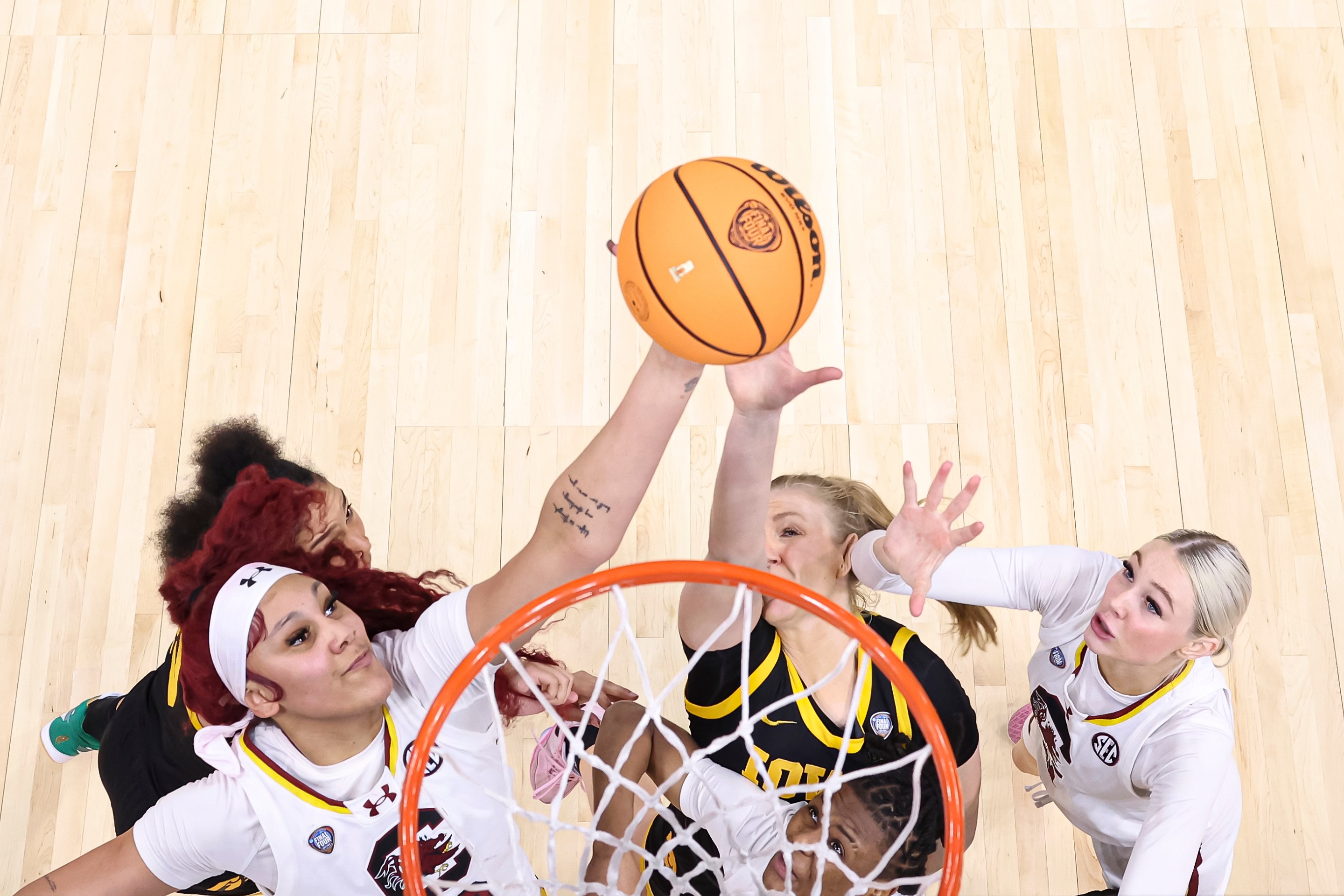They show up in waves. Every time South Carolina seemed close to being understood or figured out, the Gamecocks arrived with a new wrinkle. It was true all season, and true in the game that mattered most. Wear out Kamilla Cardoso, but there are Ashlyn Watkins and Chloe Kitts, ready to back her up on the boards. Pack the paint, but die by the nation’s best volume three-point shooter in Te-Hina Paopao. Try running the floor, and be outrun instead by MiLaysia Fulwiley. Focus on the big names, and learn the hard way about a freshman, Tessa Johnson, who watched South Carolina's Final Four loss last year thinking she could one day help the team space the floor. On Sunday evening, in a brand new way, the team punctuated its undefeated season with an NCAA championship in an 87-75 win over Iowa. In doing so, they avenged the 2023 Final Four loss that had magnified their weaknesses. Suddenly the weaknesses were resolved, and the strengths were the same strengths.
The team was defined by its newness—the Gamecocks retooled this season after graduating all of last year’s starters. They were different in style, but also in temperament. Dawn Staley herself once called this year’s team the daycare to last year’s doctorate program. “It’s who they are. It’s their identity,” Staley said. “We really don’t fight that battle. We just put our earplugs in.” They were totally new, except in philosophy, which says that rebounding breaks everything open. Basketball may be a game of runs, but you can never cede the glass. Every time you can deny your opponent a chance to correct their mistake, and every time you can renew your own fight, you chip away at their spirit a little bit. South Carolina punished the Hawkeyes for their size disadvantage: The total damage was a 51-29 total rebounding edge, 18-7 on the offensive glass. The 6-foot-7 Cardoso accounted for 17 of those boards on her way to being named Most Outstanding Player.
They were totally new, except in what they were playing for, which was an old vexation, the sting of an undefeated season cut short in last year’s Final Four. Raven Johnson, so humiliated by her performance against Iowa last year that she considered quitting basketball, called this game an “apology.” After a year of agony, she settled her score with the national player of the year. Caitlin Clark scored 18 points in an electric first quarter for Iowa, but just 12 more once Johnson was given the toughest defensive assignment in the country. Clark's handle, the typically flawless key to everything she can do on offense, looked a mess against Johnson. With a steal before the half, the sophomore guard set the table for another of South Carolina's crushing third quarters. Iowa had hung in there, but hanging in there for a half was all they could do.
THAT'S HOW YOU FINISH OUT THE HALF GAMECOCKS‼️
— South Carolina Women's Basketball (@GamecockWBB) April 7, 2024
📺 @ABCNetwork pic.twitter.com/Eo4oHxXsoB
Both Johnson and Staley dedicated the win to last year's senior class, the Freshies, in the moments after they won the championship Sunday. That this group was so on her mind says a lot, I think, about how Staley sees this team—not as as some discrete unit, the 2023-24 Gamecocks, but as part of an ongoing project. At a program like South Carolina's, Staley has said, every player makes some sacrifice. The seniors sacrifice to get the juniors and the sophomores and the freshmen more experience. The starters sacrifice to develop the bench. Maybe you know the stat about South Carolina's bench scoring—37 points to 0 from Iowa's—but it's almost difficult to separate this team into starters and bench. The Gamecocks are all just players who do what's asked of them.
Championships repay and reframe that sacrifice. “I think MiLaysia Fulwiley has been very patient with us,” Staley said in the championship press conference. When the Gamecocks opened the women’s college basketball season in Paris, Fulwiley made an instant impression. Entire teams are built to showcase players like her, the dazzling athlete; every year, programs heap the weight of the world on their shiny new toy. But Staley, seeing a player who could still use some refining, did what was best for the team and for Fulwiley. The freshman took over some games and logged 10 minutes in others. “To be able to have a household name coming off the bench, playing maybe, probably less than 20 minutes a game, where she could have gone anywhere else in the country and they'd have given her the ball time and time again ... I appreciate her sacrifice.”
I don’t mean this in a cranky way; these are just the simple facts of college basketball now: The incentives to play somewhere that guarantees its stars heavy minutes have never been greater. The path to go play at that other school has never been less obstructed. All that can explain South Carolina is an equal force working in the other direction. Something, or someone, strong enough to convince these players of a bigger picture.
Staley, the only woman ever named Most Outstanding Player in a losing effort at the tournament, knows that hard work and sacrifice don't always yield glory. But quiet can be its own reward. Before South Carolina's Elite Eight game, a reporter asked Staley why she thought so much attention was on other games in that round—Iowa vs. LSU and USC vs. UConn. “I don’t know, but I like it,” she said. “Go ahead, take the spotlight, put it somewhere else. Let this team continue to thrive in the space that they're given.” There's another difference between this year’s team and last year’s team: their actual pace. The Gamecocks remade themselves, looked ahead, and just kept running.






